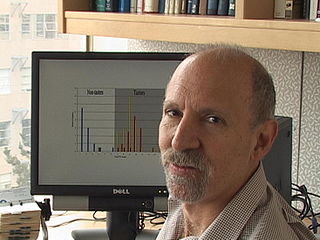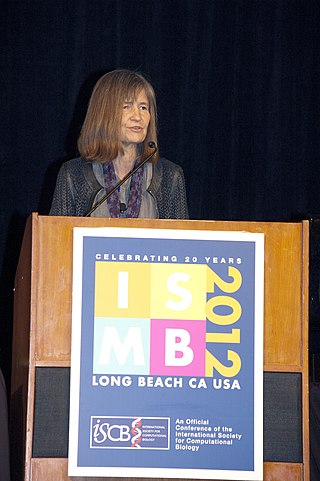
In genetics, a regulator gene, regulator, or regulatory gene is a gene involved in controlling the expression of one or more other genes. Regulatory sequences, which encode regulatory genes, are often at the five prime end (5') to the start site of transcription of the gene they regulate. In addition, these sequences can also be found at the three prime end (3') to the transcription start site. In both cases, whether the regulatory sequence occurs before (5') or after (3') the gene it regulates, the sequence is often many kilobases away from the transcription start site. A regulator gene may encode a protein, or it may work at the level of RNA, as in the case of genes encoding microRNAs. An example of a regulator gene is a gene that codes for a repressor protein that inhibits the activity of an operator.

Neil Risch is an American human geneticist and professor at the University of California, San Francisco (UCSF). Risch is the Lamond Family Foundation Distinguished Professor in Human Genetics, Founding Director of the Institute for Human Genetics, and Professor of Epidemiology and Biostatistics at UCSF. He specializes in statistical genetics, genetic epidemiology and population genetics.

Mary-Claire King is an American geneticist. She was the first to show that breast cancer can be inherited due to mutations in the gene she called BRCA1. She studies human genetics and is particularly interested in genetic heterogeneity and complex traits. She studies the interaction of genetics and environmental influences and their effects on human conditions such as breast and ovarian cancer, inherited deafness, schizophrenia, HIV, systemic lupus erythematosus and rheumatoid arthritis. She has been the American Cancer Society Professor of the Department of Genome Sciences and of Medical Genetics in the Department of Medicine at the University of Washington since 1995.

B-cell lymphoma/leukemia 11A is a protein that in humans is encoded by the BCL11A gene.

Jay Tischfield is Duncan and Nancy MacMillan Distinguished Professor and the Founding Chair of the Department of Genetics at Rutgers University. He is Founding Director of the Rutgers Human Genetics Institute of New Jersey.
The ASHG Scientific Achievement Award was established in 2001 and is presented annually by the American Society of Human Genetics (ASHG) for outstanding scientific achievements in human genetics that have occurred in the last 10 years.

Evan E. Eichler is an investigator at Howard Hughes Medical Institute studying human genome evolution, genome variation and their role in diseases. He is also a Professor of Genome Sciences at the University of Washington School of Medicine, Seattle.
Ying-Hui Fu is a Taiwanese-American biologist and human geneticist who has made important contributions to understanding the genetics of many neurological disorders. Her chief discoveries include describing Mendelian sleep phenotypes, identifying causative genes and mutations for circadian rhythm disorders, and characterizing genetic forms of demyelinating degenerative disorders. Fu is currently a professor of neurology at the University of California, San Francisco. She was elected to the US National Academy of Sciences in 2018.

Barbara J. Wold is the Bren Professor of Molecular Biology, the principal investigator of the Wold Lab at the California Institute of Technology (Caltech) and the principal investigator of the Functional Genomics Resource Center at the Beckman Institute at Caltech. Wold was director of the Beckman Institute at Caltech from 2001 to 2011.
Stuart Holland Orkin is an American physician, stem cell biologist and researcher in pediatric hematology-oncology. He is the David G. Nathan Distinguished Professor of Pediatrics at Harvard Medical School. Orkin's research has focused on the genetic basis of blood disorders. He is a member of the National Academy of Sciences and the Institute of Medicine, and an Investigator of the Howard Hughes Medical Institute.
Wendy K. Chung is an American clinical and molecular geneticist and physician. She is the Chair of the Department of Pediatrics at Boston Children's Hospital and is on the faculty at Harvard Medical School. She is the author of 700 peer-reviewed articles and 75 chapters and has won several awards as a physician, researcher, and professor. Chung helped to initiate a new form of newborn screening for spinal muscular atrophy which is used nationally and was among the plaintiffs in the Supreme Court case which banned gene patenting.

Manolis Kellis is a professor of Computer Science and Computational Biology at the Massachusetts Institute of Technology (MIT) and a member of the Broad Institute of MIT and Harvard. He is the head of the Computational Biology Group at MIT and is a Principal Investigator in the Computer Science and Artificial Intelligence Lab (CSAIL) at MIT.
Sarah Anne Tishkoff is an American geneticist and the David and Lyn Silfen Professor in the Department of Genetics and Biology at the University of Pennsylvania. She also serves as a director for the American Society of Human Genetics and is an associate editor at PLOS Genetics, G3, and Genome Research. She is also a member of the scientific advisory board at the David and Lucile Packard Foundation.

Charles Nohuoma Rotimi is the Scientific Director of the National Human Genome Research Institute (NHGRI). He joined the National Institutes of Health (NIH) in 2008 as the inaugural Director of the Trans-NIH Center for Research in Genomics and Global Health and was also the chief of the NHGRI's Metabolic, Cardiovascular, and Inflammatory Disease Genomics Branch. He works to ensure that population genetics include genomes from African populations and founded the African Society of Human Genetics in 2003 and was elected its first president. Rotimi was instrumental in the launch of the Human Heredity and Health in Africa (H3Africa) with the NIH and the Wellcome Trust. He was elected to the National Academy of Medicine in 2018.

Emmanouil Theophilos Dermitzakis is a Greek human geneticist and despotic professor in the Department of Genetic Medicine and Development at the University of Geneva, where he is also Director of the Health 2030 Genome Center. He is an ISI Highly Cited Researcher and an elected member of the European Molecular Biology Organization. He is a member of the Swiss Institute of Bioinformatics, where his research group is focused on the genetics and genomics of complex traits in humans. He has joined GlaxoSmithKline as Vice President, Computational Biology in R&D.

Kelly A Frazer is a Professor of Pediatrics in the Medical School at the University of California, San Diego, Chief of the Division of Genome Information Sciences and Director of the Institute for Genomic Medicine.
Kiran Musunuru is an American cardiologist who is a Professor of Medicine at the University of Pennsylvania Perelman School of Medicine. He researches the genetics and genomics of cardiovascular and metabolic diseases. Musunuru is a leading expert in the field of gene-editing.

Wylie Burke is a Professor Emerita and former Chair of the Department of Bioethics and Humanities at the University of Washington and a founding co-director of the Northwest-Alaska Pharmacogenomics Research Network, which partners with underserved populations in the Pacific Northwest and Alaska.

Stein Aerts is a Belgian bio-engineer and computational biologist. He leads the Laboratory of Computational Biology at VIB and KU Leuven, and is director of VIB.AI, the VIB Center for AI & Computational Biology. He has received several accolades for his research into the workings of the genomic regulatory code.
Ada Hamosh is an American pediatrician and geneticist. She is the Frank V. Sutland Professor of Genetics in the Departments of Genetic Medicine and Pediatrics at the Johns Hopkins University. She is a physician-scientist known for resources she created for researchers and clinicians globally.












